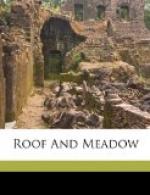But the fight quickly spread. It is the English sparrow’s way of waking up; his way of whetting his appetite for breakfast; his way of digesting his dinner; his way of settling his supper—his normal waking way.
To the clatter of voices was added the flutter of wings; for the birds had begun to shift perches, and to exchange slaps as well as to call names—the movement setting toward the tree-tops. None of the sparrows had left the roost. The storm of chatter increased and the buzz of wings quickened into a steady whir, the noise holding its own with that of the ice-wagons pounding past. The birds were filling the top-most branches, a gathering of the clans, evidently, for the day’s start. The clock in Scollay Square station pointed to five minutes to five, and just before the hour struck, two birds launched out and spun away.
The exodus had commenced. The rest of Boston was not stirring yet. It was still early; hardly a flush of warmth had washed the pearl. But the sparrows had many matters to attend to before all the milkmen and bakers got abroad: they must take their morning dust-bath, for one thing, in the worn places between the cobble-stones, before the street-sprinkler began its sloppy rounds.
There was a constant whirl out of the tree-tops now. Occasionally a bird flew off alone, but most of them left in small flocks, just as I should see them return in the evening. Doubtless the members of these flocks were the birds belonging to certain neighborhoods, those that nested and fed about certain squares, large door-yards, and leafy courts. They may indeed have been families that were hatched last summer.
The birds that left singly went away, as a rule, over the roofs toward the denser business sections of the city, while the bands, as I had noticed them come in at night, took the opposite course, toward Cambridge and Charlestown. Not more than one in a hundred flew south across the city.
Of course there are sparrows all over Boston. There is no street too narrow, too noisy, too dank with the smell of leather for them. They seem as numerous where the rush of drays is thickest as in the open breathing-places where the fountains play. They are in every quarter, yet those to the east and south of the old burial-ground do not belong to the roost. Perhaps they have graveyards of their own in their sections, though I have been unable to find them. So far as I know, this is the only roost in or about Boston. And this is the stranger since so few of the total number of the Boston sparrows sleep here. A careful estimate showed me that there could not have been more than six or seven thousand in the roost. One would almost say there were as many millions in Boston. And where do these millions sleep? For the most part, each one alone behind his sign-board or shutter near his local feeding-grounds.




